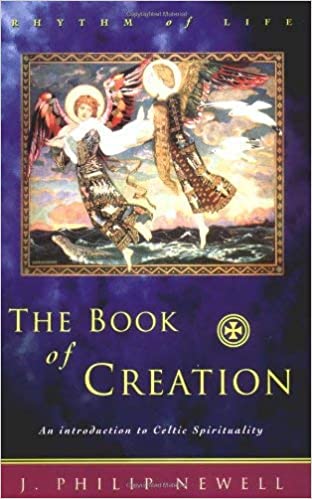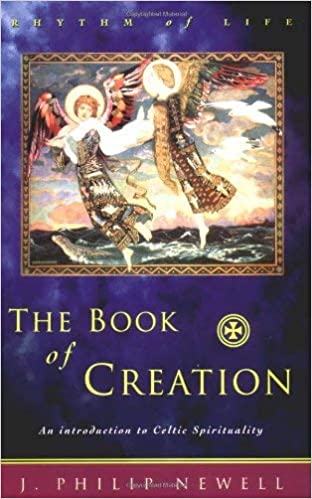
Celtic spirituality is a unique flavour of Christianity that developed in the UK in the 5th and 6th centuries. The Catholic version of the faith receded from the island with the fall of the Roman empire, and a more indigenous version of Christianity developed for two centuries unencumbered from centralized influence. Renewed Roman Catholic expansion set the two forms of Christianity on a collision course. They argued about hair cuts and holy days, but there were more significant issues at stake. In 664, the council of Whitby rejected Celtic Christianity. Heretics were named and kicked out of the church. Those who continued to cling to non-Roman ways of belief & practice were harried and persecuted throughout the following centuries. This “bangers and mash” version of the faith hovered on the edge extinction from Whitby to the modern era. But amazingly, it survived. For the last century, a more inclusive perspective on the various iterations of the Christian faith has emerged, and it has once again started to thrive.
- More good than bad: The Celtic tradition celebrates a goodness that is deeper than evil.
“The deepest part of us is not our depravity, what is deepest in us is of God…Dark streaks of sin and suffering reach deep into the body of creation but at its heart remains brilliance that has not been overcome by the darkness. It is to this light that we are called to be reconnected, both within ourselves and in all things
Page 4-5
Redemption is essentially the journey of being reconnected to the light of God within.
“In repenting, we turn around, not to become someone other than ourselves, but to become truly ourselves.”
Augustine and his spiritual progeny were not fans of this sort of thinking. We are not fundamentally good, he taught. Salvation is no reawakening to our inner goodness. “We suck!” Was more his approach. We are rotten through and through. We are dead in trespasses and sins. Only a new life in Christ can help us. According to Augustine, Pelagius (an outspoken Celtic Christian) put too much hope in humanity and not enough in God.
Augustine’s camp, armed with the theological construct of “total depravity,” won the argument. Should they have?
- A different way of understanding evangelism: A good Christian missionary plans to take the light of God’s love into the darkness fo the world. This is not how Celtic Christianity understood evangelism. The light is already there in every person. The key is to help people rediscover it. Sin is a blackness that covers up the light. The grace of Jesus helps people reawaken themselves to their true nature, which at its deepest parts, is fundamentally good.
- Women get to play too: The Celts didn’t get the memo “no women allowed” when it came to church leadership. They believed that the sun was masculine, the moon feminine and both worked with great equality to bring about human flourishing. However, this didn’t exactly create an egalitarian utopia. The women and men who worked closely together in the monasteries, for example, all had taken vows of celibacy. There is no greater sledgehammer to a good solid vow than the heat of passion, which is inevitable when men and women work closely together. These scandals were just the evidence needed to push women out of ministerial leadership in the coming centuries.
- Early environmentalists: All ground is holy was the idea. It is no heresy to have a deep love for creation. The earth and sky are God’s church building. Many of the Celtic faithful preferred to worship barefoot and in nature. Celtic teachers taught that healthy spirituality is connected to restorative care of the natural world. The gift of nature was as important as the gift of grace. Both the sun in the sky and The Son of God were to be revered. Of course, after Whitby, all this nature-loving smacked of paganism to the powers that be and attempts were made to crush the many Celtic traditions that honoured nature.
- Redeem it, don’t trash it: Christ was preached as the fulfilment of everything true before the rise of Christianity. This meant that pre-Chrisitan terms, traditions, architecture and activities didn’t necessarily have to be destroyed simply because they were not overtly Christian in their origin. Truth is truth, wherever it is found, but to Western Roman and later Protestant Christianity, this was perceived as a misguided attempt to hang on to pagan roots.
- Listen to the longing of your heart is good advice:
“The repentance that accompanies the gift of grace restores us to the well being of our human nature. That includes a recollection of the desires that have been planted within us. The deepest of which is our desire for God.”
Page 96
“We are longing for God while at the same time not knowing what it is we long for… divine grace restores our soul’s memory and heals our deep infection. The gospel is given to restore our memory of what lies deepest within us.
Page 87
We may be adept at denying the yearnings that stir within us for that light, and we may prefer to follow distractions at the surface of life rather than address the deep longings that arise from the heart of who we are, but there is within each of us what Alexander Scott calls a homesickness. It is a desire to be recollected to what is first or deepest in life.
- Freedom over Fear and the Wildness of God – Unlike Western Christianity, Celtic Christians didn’t have the same knee jerk reaction to suppress anything unknown, or sensual, or that didn’t fit with tightly guarded dogma and practice. Celtic spirituality celebrates God’s wildness and unpredictability, so it seeks to release creative energy, not shut it down. It supports the freedom of imagination. So, for example, in Celtic spirituality, fertility and lovemaking were celebrated, not hushed up. Prayers to the dead were ok because it gave confidence that heaven was near. People were encouraged to follow the truth wherever they found it. To follow what one knows wasn’t necessarily the goal. Instead, the Celtic faithful were pushed to dig into what they didn’t know.
- A bit too communist for me, but still… Pelagius says that a Christian is one “Whose door is closed to no one and whose food is offered to all” Clearly, Pelagius didn’t live in the Downtown East Side of Vancouver! But his sentiments are in the right place. Even still, he was for the radical distribution of wealth. Earth’s bounty is a gift from God for all he taught, and it was diabolical for some to go without, while others had plenty. Naturally, this sort of teaching put him at odds with the Roman church. The Pope was too wealthy to share at the level Pelagius demanded. I’m a child of capitalism, and I’m on the other side of the failed experiment of Soviet communism. But the absolute disparity of wealth that I see on Vancouver’s streets every day has to be at some level wrong. Right?
I loved a lot of what I read. I’m intrigued. I want to learn more.





One Response